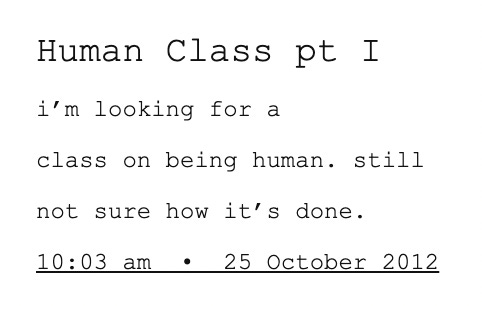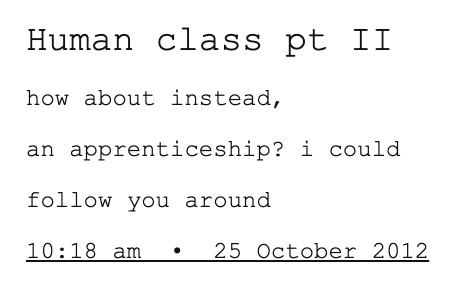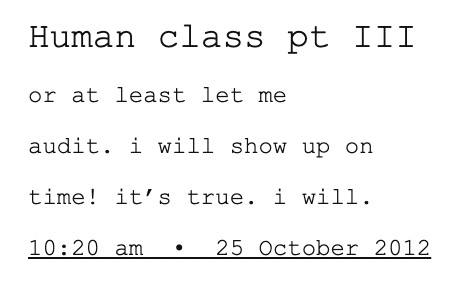Hello :) from what feels like a bit of a hiatus. I’m learning that it’s rarely a good sign when I don’t post regularly on here. Writing is one of my tools for staying sane. Although when I started this newsletter I made no promises for how frequently I would write, I’m gearing up to establish a more consistent output in the next few months. Stay tuned!
I wrote the above haiku over a decade ago on one of my secret blogs of the 2010s. It’s silly, but true. I am forever looking for that class.
A recent New Yorker article, “Agnes Callard’s Marriage of the Minds,” profiles a philosopher and her decision to construct a family with both her ex-husband and current husband, who was formerly her student. After she and the graduate student professed their love for each other, Callard realized she had to pursue what felt like an “inner experience” that she lacked with her then-husband. The next day, she asked him for a divorce.
The more I try to describe the piece, written by Rachel Aviv, the more I realize how masterful it is. I’m not sure whether the author intended the profile to be provocative—certainly, Callard’s family model could be considered “unorthodox” or “experimental,” but it’s also not so different from many queer or otherwise non-nuclear family arrangements. There’s a near-absurdity to Callard’s rigor, her ability to trust herself and defy convention despite her worry for how her choices will affect her two children. Then again, her clarity is bolstered by her deep understanding of Socrates (see? this sentence is absurd) and her commitment as a public philosopher to examining social conventions through the lens of ancient philosophy and ethics.
I don’t really care whether the piece, or Callard’s life, is absurd. Because here, finally, was that ever-intoxicating glimpse into another person’s intimacies. Here was a glimpse into how someone views and constructs their inner life.
What an excellent addition to the “being human” syllabus.
Not everyone wants to so boldly share their intimate lives. I like to process my feelings out loud, both with a confidante and with the person I’m in conflict with. Not everyone has this same desire. Not everyone has a compatible communication style. It’s hard to hit what to me feels like an impasse in a relationship while realizing maybe the other person doesn’t view it that way at all.
In considering why some people don’t want to engage in such personal examination of their lives, I recall Jenny Zhang’s interview with The Creative Independent, discussed here, in which she explains that certain content asks to be created in certain forms. If she feels an idea can’t be expressed with “conventional language,” it becomes a poem.
Sometimes abstraction saves us from confronting ideas that are too sharp, too multifaceted, too unknown to be pinned down in direct discourse. Unlike Callard, it might be impossible, or undesirable, for the rest of us to be so exacting all the time. Sometimes we need to tell stories about other people to explore, or to enforce, our own moral values. So we speak in abstractions about others to convey what we want and how we feel.
In that same New Yorker article, Rachel Aviv cites literary critic Phyllis Rose’s distinction between meaningful discourse about marriage and mere gossip. Rose says: “We are desperate for information about how other people live because we want to know how to live ourselves, yet we are taught to see this desire as an illegitimate form of prying.”
“We are desperate for information about how other people live because we want to know how to live ourselves, yet we are taught to see this desire as an illegitimate form of prying.” -Phyllis Rose
Instead of being disparaged for discussing marriage and personal life, Rose says it should be taken as seriously as conversations about national elections. “Cultural pressure to avoid such talk as ‘gossip’ ought to be resisted, in a spirit of good citizenship.”
I’m heartened by this analogy. Our personal choices are inherently political; indeed, this idea is so universal I’m at a loss for who to cite. How we treat our loved ones reflects our values, which extend outward into the society we want to inhabit. I often feel that I struggle with embodying my values. How I am succeeding and failing in this goal is one of the most enjoyable, and simultaneously painful, things to discuss.
I’ve often felt a tension between the genuine learning that comes out of dissecting my and others’ choices and the sense that what I’m doing is somehow gossip and therefore wrong. I think it boils down to intention. There’s a difference between spreading rumors and genuinely engaging with the hard questions of, how do I want to live?, and, what can I learn from observing others?
It’s the lifelong pursuit of being human.1 It’s why I’m here, writing and reading all these personal essay newsletters. It’s how I connect with others, how I feel seen and alive. It’s finding comfort in walking a path of unknowing, alongside others, in comfort and in strife. I’m just trying to learn. Teach me <3
I couldn’t find a way to cite it directly but, Sheila Heti’s How Should a Person Be? has been dancing in my head throughout this post. Another one for the syllabus, no doubt.








I enjoyed this thought provoking issue of vessels. Thank you!
I plan to write about this in my next post but, TIL that there's a podcast called "How to be Human"! And the podcaster interviews a lot of people I follow/like! Geez sometimes the world is small and we all circle the same ideas over and over again it seems... podcast link here: https://podcasts.apple.com/us/podcast/how-to-be-human/id1575612024